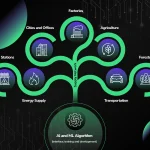When we refer to intelligent devices as being “smart,” we are acknowledging their capability to operate autonomously through the use of computer technology. Unlike traditional smart devices that can perform tasks automatically, intelligent devices take it a step further by learning and adapting to various situations, much like human beings. Utilizing Artificial Intelligence, these devices analyze data and past interactions to enhance their performance over time. This distinction becomes crucial as it highlights the need for more advanced hardware and computational power in intelligent devices compared to their smart counterparts. However, the interchangeable use of terms like “smart” and “intelligent” in marketing often leads to confusion for consumers.
Therefore, understanding the specific functionalities of these devices is essential when considering a purchase. This article will delve deeper into the differences between smart and intelligent devices, shedding light on their unique capabilities and how they can enhance user experiences.
Intelligent devices have evolved significantly from traditional smart devices, transitioning from basic automation to advanced capabilities powered by artificial intelligence. This evolution marks a shift towards devices that can adapt, learn, and make decisions based on data and patterns.
How Artificial Intelligence Empowers Devices
Artificial intelligence plays a pivotal role in empowering devices to become intelligent. By leveraging AI algorithms, devices can extract valuable insights from data and user interactions, enabling them to enhance their functionality over time. This not only improves user experience but also allows devices to anticipate user needs and preferences, making them more intuitive and responsive.
The Role of Data Analysis and Pattern Recognition
Data analysis and pattern recognition are essential components of intelligent devices. These capabilities enable devices to identify trends, anomalies, and potential security threats by analyzing vast amounts of data in real-time. By recognizing patterns in user behavior and data inputs, devices can proactively respond to changing circumstances and mitigate risks effectively.
Implications of Misleading Terminology in the Technology Industry:
- Transparency and authenticity are crucial in the market.
- Consumers should scrutinize claims made by sellers.
- Understanding the actual capabilities of IoT devices is essential.
In conclusion, the evolution of intelligent devices signifies a paradigm shift in the realm of technology. By incorporating artificial intelligence, data analysis, and pattern recognition, devices are not only becoming smarter but also more intuitive and proactive in addressing user needs and security concerns. It is imperative for consumers to understand the distinctions between smart and intelligent devices to make informed decisions and leverage the full potential of advanced technologies.
Smart vs. Intelligent Devices: Unveiling the Differences
The distinction between smart and intelligent devices lies in their operational autonomy and user interaction. Smart devices typically follow pre-programmed instructions with limited user input, while intelligent devices have the ability to learn from user behavior and adapt their actions accordingly. This difference is crucial in understanding the capabilities of these devices.
Operational Autonomy and User Interaction
Smart devices operate based on predefined rules and commands, requiring minimal user interaction beyond initial setup. On the other hand, intelligent devices can analyze data, identify patterns, and make decisions to enhance user experience. This advanced level of autonomy and interaction sets intelligent devices apart from their smart counterparts.
Learning and Adapting: The Hallmark of Intelligence
The hallmark of intelligence in devices is their ability to learn and adapt. Intelligent devices utilize artificial intelligence to extract knowledge from data and user interactions, continuously improving their performance over time. This adaptive capability distinguishes intelligent devices from smart devices that lack the capacity for autonomous learning.
Hardware and Computational Needs
Intelligent devices require more advanced hardware components and computational power to support their learning and adaptive capabilities. This includes specialized processors, memory, and sensors that enable intelligent devices to process and analyze vast amounts of data efficiently. In contrast, smart devices may rely on simpler hardware configurations, making them more cost-effective but limiting their potential for advanced functionality.
The impact of smart devices on daily life
Increase efficiency and performance
Smart devices have had a significant impact on daily life, which have increased efficiency and performance in various aspects. These devices are designed to simplify tasks and processes, saving time and increasing productivity for people. By automating repetitive tasks, smart devices allow users to focus on more important issues, resulting in a more efficient and organized daily routine.
Execution of tasks and processes automatically
With the evolution of predictive analytics in smart devices, they have revolutionized the user experience, helping users by providing personalized and customized solutions. By analyzing data and user behavior patterns, these devices can predict needs and preferences and provide proactive suggestions and recommendations. This predictability not only increases user satisfaction but also creates a deeper level of engagement with the device and creates a smooth and transparent user experience.
Predictive analytics and user experience
Overall, the impact of smart devices on our daily lives is profound as they have fundamentally changed the way we interact with technology and perform everyday tasks. From streamlining routine activities to providing predictive insights, these devices have become indispensable tools that enable efficiency optimization, process automation, and user experience enhancement. With the advancement of technology, the role of smart devices in shaping daily life is only going to increase and provide the best solutions for users.
Navigating the Market: Smart and Intelligent Devices
Deciphering Marketing Terms: What You Need to Know
Understanding the marketing terms associated with smart and intelligent devices is crucial for consumers to make informed decisions. Smart devices are capable of independent actions through computer software, while intelligent devices go a step further by adapting and learning from different situations, similar to humans. This distinction is important as intelligent devices typically require more computational power and are therefore more expensive than smart devices. Consumers should be wary of deceptive marketing practices that mislabel products as AI-driven or intelligent devices when they lack true artificial intelligence functionalities.
Key Considerations When Purchasing Intelligent Devices
When purchasing intelligent devices, there are key considerations that consumers should keep in mind. It is essential to inquire about the specific functionalities of the device to ensure that it aligns with expectations. Additionally, consumers should be cautious of false expectations that may arise from ambiguous translations of smart and intelligent device terminology in different languages. Encryption and data protection are vital aspects to safeguard sensitive information during transactions, emphasizing the importance of cybersecurity measures in the digital age.
Future Trends in Device Intelligence
Technological Advancements:
- Continuous advancements in technology are shaping the future of device intelligence.
- Integration of artificial intelligence and machine learning algorithms is enhancing the capabilities of intelligent devices.
Data Privacy and Security:
- Increasing concerns about data privacy and security are driving the development of more robust encryption and protection measures.
- Consumers are becoming more aware of the importance of safeguarding their personal information when using intelligent devices.
In conclusion, the landscape of smart and intelligent devices is rapidly evolving, with future trends focusing on technological advancements and data privacy. Consumers must stay informed about marketing terms, consider key factors when purchasing intelligent devices, and be prepared for upcoming trends in device intelligence to make informed choices in the ever-changing market.
conclusion
In conclusion, the evolution of intelligent devices has revolutionized daily life, enhancing efficiency and performance across various aspects. The distinction between smart and intelligent devices lies in their operational autonomy and user interaction, with intelligent devices having the ability to learn and adapt based on user behavior. Understanding these differences is crucial for consumers to make informed decisions and fully leverage the potential of advanced technologies.
Additionally, deciphering marketing terms associated with smart and intelligent devices is essential to ensure data protection and cybersecurity measures are in place. Overall, the impact of intelligent devices on daily life is undeniable, providing personalized solutions and transforming user experiences in the digital age.




